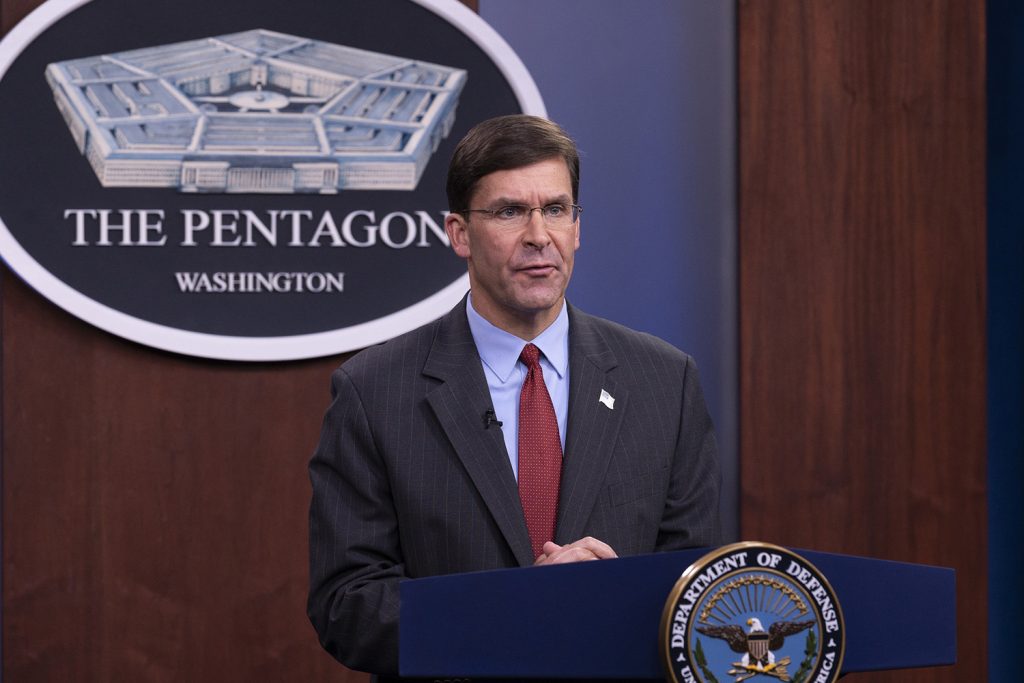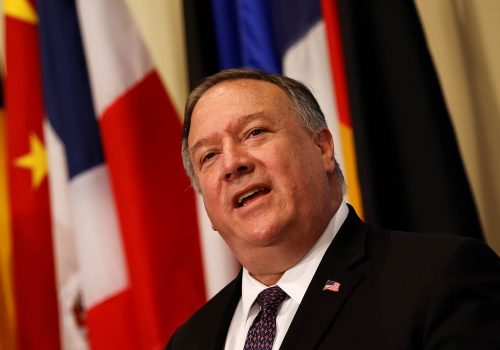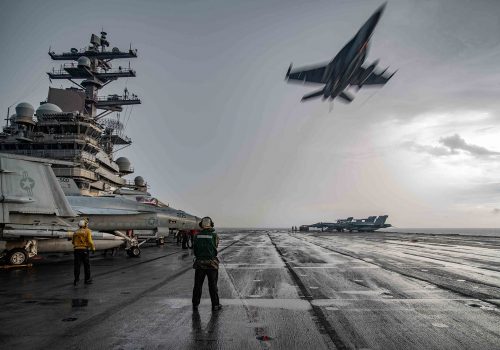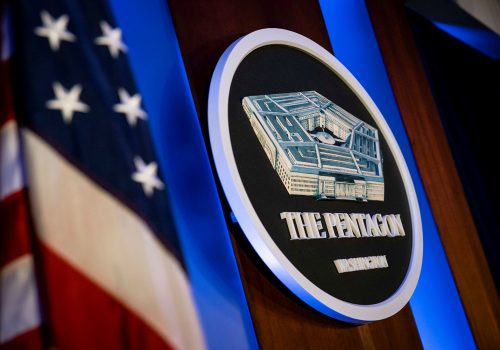As the United States prepares for long-term competition with adversaries such as China and Russia, the Department of Defense is unveiling new plans to strengthen America’s network of alliances and partnerships. “Our global constellation of allies and partners remain an enduring strength that our competitors and adversaries simply cannot match,” US Secretary of Defense Mark Esper said during an Atlantic Council Front Page event on October 20.
Recognizing this critical advantage, the Department of Defense has launched two new initiatives: new “Guidance for Development of Alliances and Partnerships” (GDAP) and an effort to modernize the defense trade. As Esper explained, the United States cannot “take our long-standing network of relationships for granted,” and these new programs will help maintain an “asymmetric advantage” over Russia and China.
Here’s a quick look at what Esper said about the importance of allies in great-power competition, the new initiatives to strengthen US partnerships, and how the United States and its allies can push back against the threats from Beijing and Moscow:
America’s secret weapon: Friends
- The growing Chinese and Russian threats: Although the United States continues to be confronted by a broad spectrum of threats, from nuclear nonproliferation to international terrorism, Esper argued that the biggest challenge for US national security is the increasing aggression of Russia and China. “Our primary competitors, China and Russia, are rapidly modernizing their armed forces and using their growing strength to ignore international law, violate the sovereignty of states, and shift the balance of power in their favor,” he said. Chinese military provocation in the South China Sea and Russia’s illegal annexation of Crimea and invasion of Ukraine “demonstrate their brazen attempts to chip away at the autonomy of others and undermine the resilience and cohesion of countries and institutions critical to US security, including NATO,” he added.
- No friends for America’s enemies: While Beijing and Moscow’s military-modernization efforts are troubling, Esper argued that both countries lack a key tool for international influence: partnerships. “China and Russia probably have fewer than ten allies combined,” he said, and their violations of international law will make it even more difficult for them to find reliable partners.
- Historical (but not inevitable) ties: The United States, by contrast, enjoys not only an extensive “network of allies and partners,” but also relationships that are “rooted deep in our common values and interests” and have “weathered the storms of history and remain the backbone of the international rules-based order,” Esper explained. While this means that the United States has the benefit of knowing that allies and partners will be there to help in times of need, Esper cautioned that “our ability to maintain this advantage is not pre-ordained, nor can we take our long-standing network of relationships for granted.”
Watch Esper’s full remarks:
GDAP: A roadmap for bolstering partnerships
- Great-power competition requires a global approach: In recognition of the importance of revitalizing these relationships, Esper launched the GDAP as “a first-edition-of-its-kind, comprehensive, strategic approach to strengthening alliances and building partnerships.” While “in the past our international engagements were guided by regional priorities and interests,” Esper explained, the United States is now confronted with “an era of great-power competition that is global in nature,” which will require “a common set of priorities…that will drive our interactions with our foreign counterparts and improve our effectiveness.”
- A comprehensive guide for working together: Esper explained that the GDAP will enable the Department of Defense “to prioritize, align, and synchronize our security-cooperation activities across Title 10 [of the US Code] authorities to build partner capacity, better articulate the Department’s needs for priority allied and partner warfighting roles through future force planning, focus our efforts to help them shape their militaries into more capable forces, and measure and track our progress across a wide range of tools available to the Defense Department.”
- Speaking with a single voice: Esper acknowledged that international partners are often confused about what exactly US policymakers want from them, as US military commanders and political leaders often send conflicting messages. GDAP will ensure that leaders’ meetings are standardized across the Department of Defense so that partners get clear and consistent communication from the United States, Esper said. The initiative will also aim to expand foreign military participation in US professional military education to prepare “the next generation of foreign leaders to learn alongside our best and brightest.”
The United States needs empowered and equipped allies
- Imperative to share the burden: These partnerships will only be effective in meeting the challenges posed by China and Russia if allies actively contribute to military deterrence and warfighting capability, Esper added. “To overcome the increasingly complex threats in the 21st century and defend our shared values, there can be no free riders to our common security,” he said. He noted the progress NATO allies have made in meeting their pledge to spend at least 2 percent of gross domestic spending (GDP) on defense and increasing total defense spending by $130 billion since 2016.
- Extending the 2 percent goal beyond NATO: Esper argued that such commitments by NATO members should extend to all US allies. “We expect all allies to invest more in defense, at least 2 percent of GDP as the floor,” he said. “We also expect them to be ready, capable, and willing to deploy when trouble calls. And we expect them to stand shoulder to shoulder with the United States in confronting Chinese bad behavior and Russian aggression.”
- COVID has only increased need for burden-sharing: While Esper conceded that the COVID-19 pandemic has imposed severe financial costs for economies around the world, he maintained that “our threats today have not diminished, rather they have only been exacerbated as nations turn inward to recover and our competitors seek to exploit the global crisis.” He affirmed that the United States expects its allies to “stand shoulder to shoulder with the United States in confronting Chinese bad behavior and Russian aggression.”
- Providing access to resources: But the United States can also do more to ensure that its allies have the right equipment to deter Russia and China, Esper added. The Department of Defense’s new defense trade-modernization program, he explained, will attempt to expedite defense export processes that “are often too slow, opaque, and complicated,” while also competing with “China and Russia, whose state-owned industries can fast track military exports in ways that we cannot—and would never want to, in many cases.” That, in turn, can impede US efforts to build security relationships with countries whose security networks have been penetrated by Chinese or Russian equipment.
- Focusing on top priorities: Esper explained that the Pentagon will focus on four key areas of export reform: requiring “early export ability for critical weapons systems”; instituting “an agile framework for technology release”; prioritizing “countries or capabilities or both to capture or keep key markets”; and improving “the predictability of international demand to inform commercial investments and increase industrial capacity.” The Department will also launch a new “foreign military sales dashboard,” which will “track the most important cases moving along the process to ensure our partners get the equipment and systems they need, when they need them.” The dashboard will allow officials to “prioritize cases that enhance lethality and their interoperability with the United States, enable the domestic industrial base, and deny markets based in China and Russia.”
- A global network: Esper emphasized that “great-power competition requires us to engage with every nation more strategically, no matter its size.” In Europe, this means rethinking US force posture to best deter Russia. Esper noted that recent meetings in Bulgaria, Romania, Poland, and the Baltics may mean that there is “the real opportunity of keeping the Second Calvary Regiment forward in some of these countries on an enduring basis.” In the Indo-Pacific, Esper noted that he and US Secretary of State Mike Pompeo will travel to India next week for a second round of US-India “Two plus Two” discussions to strengthen their cooperation, as “India will be the most consequential partner for us, I think, in the Indo-Pacific…in this century.” At the same time, Esper also emphasized that he became the first US defense secretary to travel to the tiny Pacific island nation of Palau for consultations. Working with both big and small countries alike, Esper argued “together we will continue to deter conflict, preserve peace, and defend the free and open order that has served us all so well [and will continue to] for many more generations to come.”
David A. Wemer is associate director, editorial at the Atlantic Council. Follow him on Twitter @DavidAWemer.
Further reading:
Image: The Secretary of Defense, Mark T. Esper, during a press conference in Washington, United States on September 8, 2020. (via REUTERS)



